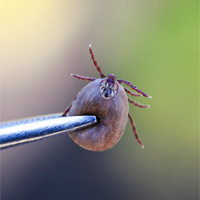Mosquitos
 Mosquito bites can cause illnesses including Zika, malaria, West Nile virus (WNV), chikungunya and others. Most people bitten by a mosquito that’s carrying Zika or WNV won’t show any symptoms or they will be mild. Decrease your risk of infection by preventing mosquito bites.
Mosquito bites can cause illnesses including Zika, malaria, West Nile virus (WNV), chikungunya and others. Most people bitten by a mosquito that’s carrying Zika or WNV won’t show any symptoms or they will be mild. Decrease your risk of infection by preventing mosquito bites.
Use EPA-registered insect repellant according to directions.
Cover exposed skin with long sleeves, long pants and hats.
Regularly empty outdoor containers that trap water such as planters, bird baths and toys.
Contact the local health department to report high numbers of mosquitoes or standing water in your neighborhood.
Ticks
Ticks are most active in spring and summer and live in areas where we work, live and play in every state in the continental U.S. The two most well-known tick-borne diseases are Lyme Disease and Rocky Mountain spotted fever (RMSF). Symptoms of these illnesses include fever, headache, fatigue and skin rash. Here’s how to protect yourself against tick bites.

Avoid tick-infested areas especially during May, June and July.
Walk in the center of trails to avoid contact with overgrown grass, brush and leaf litter.
Check armpits, behind the knees, hair and groin area for ticks after being outdoors, even your own yard.
Use EPA-approved insect repellant.
Bathe or shower soon after coming in from outdoors.
Follow your veterinarian’s advice for protecting your pets from tick bites.
Fleas
 Flea bites can transmit the plague to people and animals. Handling an animal infected with the plague and inhaling droplets from a cough of an infected person or animal can also transmit the plague. Prevent the spread of the plague:
Flea bites can transmit the plague to people and animals. Handling an animal infected with the plague and inhaling droplets from a cough of an infected person or animal can also transmit the plague. Prevent the spread of the plague:
Eliminate rodent nesting places around your home, shed, garage, woodpiles, etc.
Do not pick up or touch dead animals without protective gear and then wash thoroughly.
Avoid letting pets sleep in your bed.
Use EPA-approved insect repellant.
Treat dogs and cats regularly for fleas.
Keep pet food in rodent-proof containers.
Take sick pets to the veterinarian promptly.
Source: APIC Infection Prevention and You